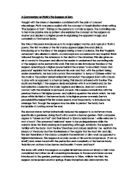The second stanza further bathetically reduces the surgeon to a craftsman: more specifically a gardener, doing God’s dirty work in a human garden. Plath compares organs to ‘tubers and fruit’ and their blood to ‘jammy substances’, while veins are ‘a mat of roots’. The unnamed ‘assistants’ seem to be undergardeners while the narrator does the finest pruning and operating. Although, evidently, the surgeon is familiar with the body, from the line ‘Stenches and colours assail me’, he exalts in the beauty of the body and the flawlessness of the organs that he must trim and clip. The last three lines of the stanza complete the sentiment of dirty work as opposed to higher interference. The surgeon is acutely aware of his own incompetence (‘I am so small’) and, when faced with the perfection and complexity of the human body, finds his own actions to be clumsy and boorish: ‘I worm and hack’
The body with which the surgeon occupies himself becomes not simply a task to be completed, but rather an all-consuming landscape. In the second stanza we are introduced to the garden, perhaps a reference to Eden, while in the third, the surgeon notes sunsets and hot springs. These metaphors also demonstrate the dehumanisation of the body on which he operates. The idea of an all-consuming task also comes through in the line ‘I am up to my elbows in it’: this gives the blood and body a more active role and gives almost the impression of it taking control of the surgeon, particularly in the line ‘Still it seeps me up’. The surgeon appears almost reluctant to ‘seal off’ the mass of veins and leave the garden, perhaps insinuating that he feels more comfortable in his ‘garden’ than in the real world, where people are not merely bodies under a mask of ‘white clay.’ In the second part of the stanza, the surgeon rhapsodises about the skill of the Romans, showing his respect for logic and discipline. Proclaiming the body to be a ‘Roman thing’, he places it on the same pedestal as ‘Aqueducts’ and ‘the Baths of Caracella’, extolling its capacity for sensible routine (for example, in the pumping of the heart), while, curiously, paying little attention to its capacity for human emotion. We may perhaps infer from this that Plath felt dehumanised by her surgeons when hospitalised. The enigmatic last line ‘It has shut its mouth on the stone pill of repose’ refers perhaps to the body being in an anaesthetised state. The surgeon appears to find this more noble than the real unreposed people he might encounter outside of the theatre.
This anaesthetised body, ‘statue’-like, is wheeled off in the fourth stanza, while the surgeon sits back and veritably rubs his hands together with glee. His operating leaves him with the trimmings of the body, perhaps unwanted cuttings and prunings of the aforementioned garden. After the high praise of the Roman body, the ‘set of teeth [...] to rattle in a bottle and take home’ seem somewhat desacrelised, indicating that the surgeon considers his work to be in removing the bad to leave only the flawless, hence leaving him only with the unnecessary and crude. This furthers our understanding of the surgeon as a man of science who sees things in black and white terms; he deals merely with the necessary and unnecessary. Cannibalism is generally seen as high taboo in most societies, and the phrase ‘a pathological salami’ seems intent on making the reader wince. This also shows the surgeon’s disregard for everything not involved in his making of perfection. The phrase ‘they will swim in vinegar like saints’ relics’ seems also somewhat tongue in cheek, as the surgeon embraces science over religion. By comparing a salami to relics, he demonstrates the importance he considers them to have. By preferring a body to a person and condemning both religion and the soul, we are left with the impression that the surgeon is indeed a highly clinical and somewhat cold individual. The last line, ‘[...] clean, pink plastic limb’ seems totally without feeling, as the surgeon’s job is done and the ‘patient’ is finished, as far as he is concerned.
The last stanza of the poem reintroduces the underappreciated soul, as the surgeon walks alone through the wards in the middle of the night. By using the words ‘a new soul’, we are given the idea that the surgeon has saved them and hence given them a fresh shot at life. Perhaps through the pain that induced surgery, they have undergone a sort of purgatory and hence their soul has been cleansed. Morphia makes reference both to morphine, as in the drug, and Morpheus, the Roman god of sleep and dreams, yet another reference to the Roman age. The surgeon seems puzzled by the after-effects of surgery; that under the ‘gauze sarcophagi’ lie individuals, floating on a morphine high. The ‘dawn drafts’ which Plath refers to further allow the reader to understand that the patients are, under the effect of morphine, floating inches from the ceiling. Making reference once again to an ancient society, the ‘gauze sarcophagi’ give the impression that the patients are, in their present state, neither dead or alive, in this ward where even the ‘night lights’ reminds the surgeon of human gore. The poem finishes much as it started, with the surgeon, having played the role of gardener, Historian and scientist, resuming his role of control as a higher being. ‘I am the sun’ indicates that the surgeon is the life-giving force in the hospital, most important for the continuation of the patients’ lives. This too may refer to deities in ancient societies such as the Aztecs. The last line further cements everything we believe about the surgeon: safe in his position of power and control, he is happy only when the people around him are being bodies, in a ‘shuttered’ state, and acknowledging listlessly the power and magic of his work.








